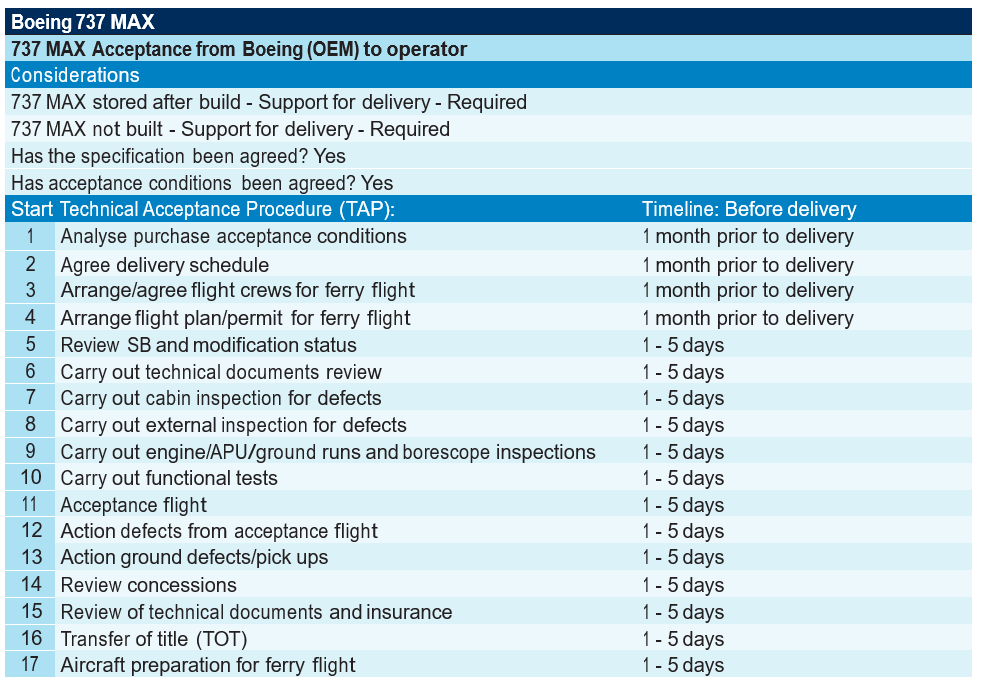17/08/2020
The grounding of Boeing's troubled 737 MAX programme over 16 months ago had an enormous impact on the global aviation industry. Operators, lessors and airports were all impacted by the consequences as well as Boeing themselves. New flight control software has been developed in relation to the, much talked about, Manoeuvring Characteristics Augmentation Systems (MCAS) and a welcome recertification process is now possible. We can allow ourselves to realistically envisage a much-needed conclusion to the aircraft's grounding by Q3 or Q4 2020.
At the time of the FAA's suspension of its airworthiness certificate, 387 MAXs were in service and a further 400 have since been manufactured by Boeing and are awaiting delivery. Maintaining aircraft in an airworthy condition to ensure they satisfy regulatory requirements and can fly safely attracts a hefty price tag. Unsurprisingly, the grounded MAXs have largely been left stored or parked and subject only to maintenance actions intended to prevent them degrading through inaction rather than preparing them for safe flight. Consequently, thorough planning will be necessary before re-entry so the aircraft can be ready to fly again as soon as they're given the green light.
Once recertification is complete and the final Airworthiness Directive issued, each aircraft will require modifications to both hardware and software to be made compliant with the new Airworthiness Directives and service bulletins. All systems and components will have to undergo an extensive inspection and testing process and given a deep clean to be sure they are completely ready to fly. It will also be essential that the engines undergo borescope and magnetic chip detector checks following the high-power runs. The likelihood of corrosion will be increased due to accumulated condensation remaining in place that would evaporate in normal operations.
This process is expected to take up to two weeks for each aircraft depending upon the number of technicians in each team.
The recent US FAA AD (2020-16-51) is an indication that there may be other issues that could be found as part of the RTS checks. This specific AD relates to 5th stage engine bleed check valves sticking open due to corrosion of the internal flapper plates and bushings due to the extended downtime.
Additional consideration will also need to be given to issues that arise simply due to the extended parking period, unrelated to the MAX recertification process.
In relation to the Covid-19 pandemic and extended parking periods, the UK's CAA issued a safety notice on 27th July (SN-2020/013) & EASA issued guidance on 20th July on RTS from storage in relation to the
Covid-19 pandemic.
Furthermore, the UK CAA issued broader considerations on the subjects of Mental Health and Human Factors as aircraft, technicians and pilots, cabin crew, ATC and ground handlers return to work.
It is therefore not simply a case of performing technical tasks, it is vital that each airline coordinates the technical process with its operating crews (flight/maintenance), its regulatory authority, maintenance organisation, continuous airworthiness manager and the aircraft financier/lessor to ensure the commercial terms are also complied with.
The procedures facing Boeing in connection with the 400 MAXs built post-grounding and yet to be delivered are more involved. Each of these aircraft is at the point just before delivery completion and will now require modifications too. Clearance of the 400 aircraft backlog was previously expected to take approximately 18-24 months as operators and lessors begin to work through the technical acceptance procedures needed prior to delivery. However in light of the limited demand in the Coronavirus environment this could now be longer. A careful analysis of the storage and preservation program will be required to understand what tasks and processes have (and have not) been performed.
Using data from our leading data intelligence platform, IBA.iQ, we can illustrate the various phases required in a post-modification scenario.

Some examples of problems found after extended parking periods are highlighted in the UK CAA safety notice and include:
Engine borescope ports found loose
Flap access panel found missing but with screws in place after a ferry flight for a maintenance check
Crew unable to start engines due to circuit breakers pulled with no log book entry to alert others
Depletion of brake accumulator pressure
Multiple AD and Never Exceed Period overruns
A rejected take off due to unreliable speed indications. Insect larvae contamination of pitot system was found even though covers had been in place during storage.
Evidently, the re-entry process includes numerous essential steps and requires careful management so delays and further loss of revenue are avoided. IBA's experienced technical team can offer their comprehensive understanding of the Boeing fleet to provide valuable support.
With over 33 years' aviation industry experience, IBA operates globally and our Technical Managers are qualified to inspect and understand all the modifications, Airworthiness Directives and service bulletins implemented on the MAX during its grounding period, with special focus on:
Storage, preservation and de-preservation, maintenance of records and evidence of maintenance activities conducted towards re-entry into service
Inspections of the replacement of any excessively reworked panels, modifications, and assembly to ensure adequate electrical bonding
Fuel contamination
Inspection and understanding of service bulletins and Airworthiness Directives on wiring bundles
Review of software updates implemented, including those applicable to the new robust MCAS
Applicable changes to the MAX's master minimum equipment list (MMEL)
IBA has experienced licensed engineers with a detailed, expert understanding of its new generation systems and we have in country resource to travel to any of the storage airports such as Victorville and Mojave, California; Marana, Arizona or any other airport across the globe.
Contact Peter Walter, Director - Technical and Asset Management, for more information on how IBA can support your business.